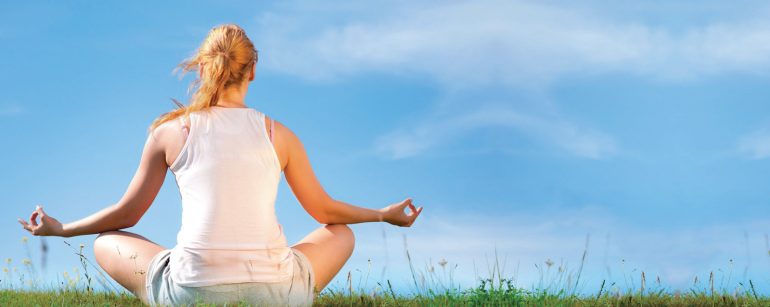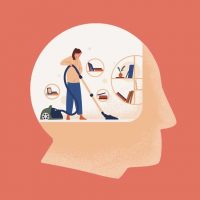We tend to take our bodies very much for granted and our health even more so. Which means that when something goes wrong it can be alarming, even frightening, as if we had been walking around inside a stranger and suddenly discover it has a mind of its own. We get mentally and physically stressed, overwhelmed and out of control, like a steam cooker coming to full pressure. And although we can turn down the heat ourselves, we often feel powerless to do so.

Not me, you think, i don’t get so stressed out that i get ill. Maybe not, but most conservative estimates suggest that 70 to 90 percent of mental and physical illnesses are either affected by or caused by stress. as such, it is a major problem. on top of that, there is no medical cure that can alleviate it. no matter how many drugs you take, a prescription can’t lighten your workload, change your life circumstances, or alter your belief systems.
We were teaching a workshop in Southwest England when Ed asked the group, “if anyone likes to suffer then raise your hand.” of course, no one raised a hand. Yet suffering is real, it happens. it is fascinating to see that the Buddha recognized suffering and its role all of 2,600 years ago, a time when there was certainly less stress. his basic teaching is how suffering is created by the longing and desire for things to be different to how they are, which is also saying that suffering is caused by the inability to be with what is, just as it is.
Belief can also cause suffering. What you believe colors your every thought, word and action. The belief that your work, family, or lifestyle is causing your anxiety, and that if you were just to change these then you’d be fine, is seeing the situation from the wrong perspective. rather, it’s the belief that is actually causing the suffering and stress, whether mental or physical. and although changing your circumstances certainly may help, invariably, no matter what you do, it’s a change within your belief system and your perception of yourself that will make the biggest difference.
For, although you may have little or no control over your circumstances, you do have control over your reaction to them. and this is where meditation differs from medication, as, unlike medication, meditation can lighten your workload, change your life circumstances by changing your attitude, or alter your belief systems.
The mind can be like a deranged monkey, leaping from one thought or drama to the next, never allowing you any time to be quiet, peaceful and still. Meditation can make a huge difference to this, which may sound farfetched, but it’s a direct way to cut through the chaotic monkey mind that’s constantly making excuses and supporting resistance. in addition, the ability to keep your peace and maintain an even-balanced state is one of the great gifts of meditation that you can bring to every situation, your thoughts and feelings, behavior and actions, so that negativity has little chance of affecting you.

Meditation gives steadiness and adaptability in a world that is constantly demanding and challenging. We can never know what is going to happen or when—nothing is predictable, permanent, secure, controllable, or dependable, everything is subject to change in every moment. This can cause tremendous anxiety, you can ignore it and live with the delusion of permanency and predictability, or you can embrace impermanence and unpredictability with awareness and dignity.
It is perhaps easier to see the connection between anxiety and relaxation or meditation, than it is to see how meditation could help someone who is physically sick, perhaps dealing with illnesses like cancer or aids. At such times, we are often more prone to self-pity or dependency on caregivers and doctors, and less able to help ourselves. Yet meditation not only reduces stress related physical problems but also moves us out of negative mindsets so that we can be at peace with what is happening. We release the resistance that causes mental anguish.
“Mortality led me to meditation. addicts talk about being ‘scared sober.’ i was scared into sitting,” writes author Mark Matousek. “being diagnosed with a then-terminal disease at age twenty-eight, i was forced as a survival mechanism to pursue an inner life.
By learning to sit through bad moments, an invisible, metaphysical muscle seemed to strengthen in the stillness. running from pain or fear made the badness worse, whereas when i stopped in the midst of it all, took my seat and let the feelings burn deeply through me, clarity slowly took the place of hysteria. Sitting was a place to empty out, grieve, refill, to remember the face behind the mask, simply by stopping and being still. That was twenty-plus years ago. My health crisis passed but the practice stayed. Meditation is on my shoulder, a reminder of beauty, truth, fragility, sorrow; a voice that whispers: ‘remember to love.’ if my outer world had not been threatened, i would never have looked for an inner one.”
One way that we create inner conflict is by not being fully present with what is. Which may sound simple, but ask yourself how it feels to fully embrace the fact that there’s only one thing you can never do and that’s change the past. it can be tough to accept that, especially if you used to be mentally or physically healthy and now you’re not. but however much you weep, beat your fists against the wall, eat bags of cookies to assuage your pain, it won’t make the slightest bit of difference and won’t make you feel any better. The past is gone, over, no more. how you were is not who you are now.
Knowing this, why do so many of us continue to live in the past, either by longing for it to repeat itself, or regretting what happened and wanting to do it all over anew? The ego mind always needs a drama or distraction to feed on. The more awake we become the less of a job the ego has until it becomes redundant. So, to preserve itself, it constantly distracts us with longing for what was, guilt, regret, desire for what could be – the list is endless. Continuing to wish that either the past would happen again or that it had been different, means that we’re really not here in the present but living in the land of what-was, or what-might-have-been, or if-only.
One of the greatest wonders of taking quiet time out, as in meditation, is that you quickly see that nothing is fixed, solid, or permanent. instead, you look with present moment-eyes. This means looking without hope, longing, regret, or even fear. Fully accepting that the past is irreversible and the future doesn’t yet exist means you can actually be in the present moment. What a relief! What a revelation! Finally you can just be here and now. Wow!
When just being present we awake to the potential in every moment. as spiritual teacher Gangaji says, “in meditation we see what comes and goes—our thoughts and feelings, longings and anxieties—and what stays, which is who we truly are within ourselves.” no matter if the past was wonderful or woeful, we are freed of left over hang-ups or unfulfilled desires, of future concerns or longings, and rest in awareness.

Today is a very special day. it has never happened before and it will never happen again. and you have no idea what will come next. What a great day just to be here. To show up now. The perfect day to let the past rest where it is and let the future take care of itself. as is every day. To experience just this moment, to pay attention to the colors, sounds, smells and sensations, to be compassionate to your feelings and other people’s feelings. and to make this day one of beauty and tenderness, a choice you are given in every moment.
 Ed and Deb Shapiro have been teaching and writing about meditation for over 30 years and are the authors of over 20 books. Their latest is The Unexpected Power of Mindfulness & Meditation and The Art of Mindful Relaxation. Deb is the author of Your Body Speaks Your Mind, now in over 20 languages. See more at EdandDebShapiro.com
Ed and Deb Shapiro have been teaching and writing about meditation for over 30 years and are the authors of over 20 books. Their latest is The Unexpected Power of Mindfulness & Meditation and The Art of Mindful Relaxation. Deb is the author of Your Body Speaks Your Mind, now in over 20 languages. See more at EdandDebShapiro.com







